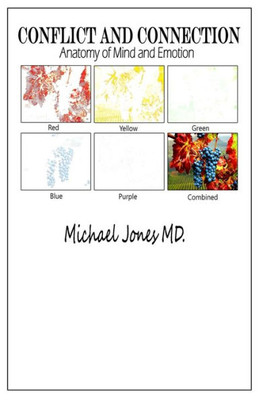

Conflict And Connection: Anatomy Of Mind And Emotion
ISBN13:
9780692134931
$13.21
We see things through emotional lenses which are tailored to assess unique aspects of value. One emotional lens is not enough to see and understand life, ourselves, or others. I propose there are seven aspects of value which match up with our seven emotions. Emotions are neither positive nor negative. Emotions are merely the conclusion of our intuition of the pivotal aspect of value in a situation and what general approach to make. The seven emotions and corresponding aspects of value are: 1) contempt - functionality/purpose, 2) sadness - accuracy/reproducibility, 3) surprise - exploration/perspective, 4) happiness - response/continuity, 5) anger - stability/strength, 6) fear - protection/preservation, 7) disgust - excellence/transcendence. It is possible to survive operating in life using only one emotional lens, but to thrive-we thrive by actually seeing and understanding life, ourselves, and others, we need to use all seven emotional lenses. This means we have to take time to reframe a situation, in order to consider all seven aspects of value before just impulsively reacting. Each emotion is experienced as if through one of the senses. 1) contempt -chills, 2) sadness - sight, 3) surprise - taste, 4) happiness - hearing, 5) anger - touch, muscle tone, 6) fear - stomach churning/twisting, 7) disgust -smell. The general approaches, or fundamental actions which our emotions can suggest are: 1) to receive, 2) to refine, 3) to expand, 4) to incorporate, 5) to hold, 6) to take, 7) to give. We intuitively match emotional lenses through posture, tone and terminology to show openness to connection. This doesn't mean that we should scrutinize our posture or words in response to someone else; the emotional lens is not the only variable in the equation of connection, and it's not one that is easily faked. If we just try to be fully present with someone, we naturally will match their emotion. Since matching emotional lenses is an intuitive action, we likely only notice we are doing it after we have already started. If we don't naturally match emotion there is probably a reason. For example, we are likely to match emotions with a friend who is venting, but less likely with someone who is just complaining. There is a reason confidence is such an attractive quality and desperateness isn't, because odds are we would rather match someone's confident emotion rather than match their desperate one. It is not a coincidence that when we are single or in the job market, that either no one wants us, or suddenly everyone wants us. Does this mean we should always be confident even if we are unsure? Yes and no... The key is to have positive (productive) emotional states which I call interpersonal tools, and avoid negative (counterproductive or misdirected) emotional states, which I call interpersonal weapons. Of the twenty-one interpersonal tools, confidence is not one, because it is not specific to one emotional lens, it is a component of each tool. When there is a conflict, it is likely that we were not communicating well about one of the interpersonal tools. I have derived these twenty one interpersonal tools from the seven emotional lenses, and I believe that conflict is usually a question about their nature: Fairness, Forgiveness, Open-mindedness, Kindness, Enthusiasm, Compassion, Appreciation, Teamwork, Prudence, Curiosity, Love, Perseverance, Acceptance, Hope, Leadership, Humility, Creativity, Social intelligence, Honesty, Investigation, Humor.How do we measure these?When we tell someone that something wasn't fair, what standard of fairness are we basing that on? When we claim that someone was unkind, what standard of kindness are we measuring with? If the nature of kindness is universal, why is there ever an argument about it?
- | Author: Michael Brent Jones
- | Publisher: Michael Brent Jones
- | Publication Date: Jun 30, 2018
- | Number of Pages: 239 pages
- | Language: English
- | Binding: Paperback/Psychology
- | ISBN-10: 069213493X
- | ISBN-13: 9780692134931
- Author:
- Michael Brent Jones
- Publisher:
- Michael Brent Jones
- Publication Date:
- Jun 30, 2018
- Number of pages:
- 239 pages
- Language:
- English
- Binding:
- Paperback/Psychology
- ISBN-10:
- 069213493X
- ISBN-13:
- 9780692134931





